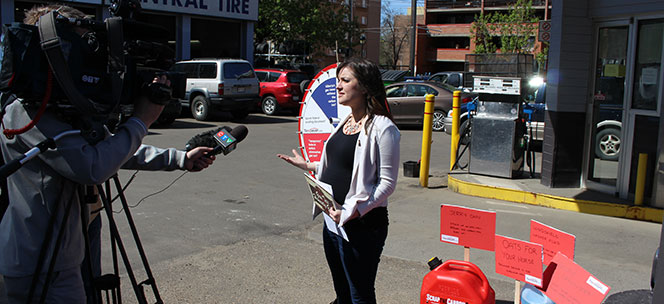Rising gas taxes dinging drivers and businesses in Edmonton

This op-ed was published the July 2017 issues of Business in Edmonton and Business in Calgary Magazines.
Rising gas prices (thanks to tax hikes) not only increase costs for businesses large to small, they also impact consumers’ ability to spend. Consumers may choose less dining at Edmonton restaurants and more dinners at home. Brick-and-mortar stores could see less traffic.
Across Alberta, job-creators and workers have reason to celebrate when oil prices are high. But when it comes to the price at the pumps, there’s no reason to artificially inflate the cost with unnecessary – and often hidden – taxes.
Many Canadians may be surprised to know they pay a “temporary federal deficit elimination gas tax” every time they fill up. That so-called temporary tax was introduced by the federal government in 1995, as a measure to tackle Ottawa’s debt and deficit problem. But two years later that government eliminated its deficit (bravo!) – but they kept the tax.
That not-so-temporary tax will have cost Canadian drivers $13.3 billion by the end of the year, and $638 million this year alone. As American economist Milton Friedman said, “there is nothing so permanent as a temporary government program.”
Another sneaky addition to the pump price is the federal government’s tax-on-tax. The government applies the sales tax on top of federal and provincial excise taxes (as well as carbon taxes) on gas, meaning you’re truly paying tax on a tax. This is on top of the sales tax paid on the before-tax gas price. In total, the tax-on-tax will cost Canadians an incredible $1.8 billion this year alone.
This time last year, Albertans enjoyed the lowest gas prices in the country. Thanks to the provincial government’s carbon tax, Manitoba and Saskatchewan now both boast lower gas prices than Alberta. The carbon tax will cost the average driver $80 this year, rising to $200 by 2022.
Fortunately for Edmonton taxpayers, the city does not have a hidden transit tax like some Canadian cities do. For example, Vancouver drivers pay the highest gas prices in the country: at $1.39 per litre, 49 cents of that is tax. Victoria drivers pay the third highest pump prices – and in both cities, it’s thanks to their added transit taxes.
City charter agreements, including potential new tax powers for Edmonton and Calgary, are set to be announced by the province this summer. In the past, the City of Calgary has discussed the potential of several new ‘revenue tools’ that could hit drivers, including gas taxes, road tolls and vehicle registration fees. If either Calgary or Edmonton wanted to impose a gas tax, it would require provincial approval – something a city charter could grant.
Provincial gas taxes have already increased by 94.3 per cent between PC and NDP hikes in the last two years. At the very least, there’s reason for Edmonton drivers to keep an eye on their local government.